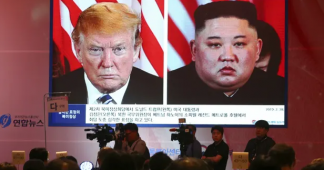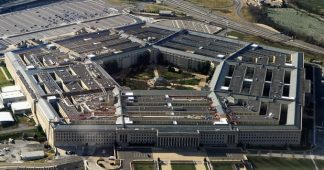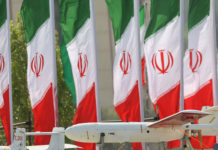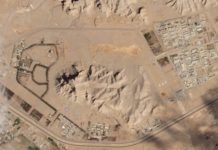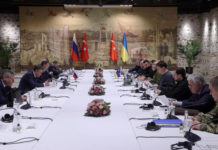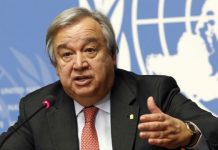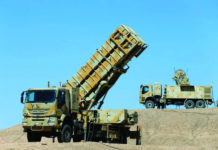His plan was always to provoke an overreaction
Posted on
Famous journalist and terrorism expert Peter Bergen is making a big mistake. Give the man credit: he had the courage to travel to Tora Bora with Peter Arnett to interview bin Laden in person back in 1997.
However, as seen in this clip from his appearance on C-SPAN 2’s Book TV on August 22, Bergen believes that Osama bin Laden’s claim in his 2004 speech that his strategy all along was to bog America down in war and “bleed us to bankruptcy” was just an after-the-fact rationalization for the failure of his real policy, which was simply to make the U.S.A. give up and run away, either right away or after a short fight.
“Bin Laden in 2004 released a video tape saying this was all a clever plan to suck the United States into the Middle East and bankrupt it. Well there’s no evidence that was his actual plan. At the time he really believed his own propaganda which is that the United States is weak. I mean when we interviewed him in 1997 for CNN, he was comparing Americans to the former Soviet Union. He really believed that if he applied enough political pressure, the United States would pull out of the Middle East.
“Then of course we invaded Afghanistan, launched the Iraq war, you know, had bases today in Kuwait, Qatar and UAE that didn’t exist before 9/11 so it backfired spectacularly. It didn’t work. And there are some people who believe that he did want to suck us into endless wars, but that is really to accept the man’s own post-facto judgement of his own failures.”
Sunday, starting at 2pm ET on @cspan 2, we're looking at
authors who have written about America, Afghanistan, and terrorism.@wesleysmorgan, "The Hardest Place," Carter Malkasian, "The American War in Afghanistan," & @scotthortonshow, "Enough Already" pic.twitter.com/jrHAunPTpi— BookTV on C-SPAN2 (@BookTV) August 20, 2021
nfortunately, our expert is mixed up.
Certainly bin Laden wanted the U.S. military to “withdraw from that part of the world,” as former Vice President Dick Cheney let slip in conversation with Tim Russert on September 16, 2001, before remembering he was supposed to say al Qaeda’s hatred for American “democracy” had motivated their attack.
It is fair to say at least that Bergen could be right that in bin Laden’s mind, Plan A would be to just scare America away. He had publicly cited America’s withdrawal from Lebanon after the Beirut truck bomb attack of 1983 and Somalia after the Black Hawk Down disaster in 1993 as proving that the U.S. was just a “paper tiger” that could be scared off with just a few small attacks.
Or perhaps he was just taunting Americans – jerking our chain – through reporters like Bergen and ABC News’s John Miller, when he talked about U.S. soldiers’ humiliation there:
“When [the mujahideen] left Afghanistan, they went to Somalia and prepared themselves carefully for a long war. They had thought that the Americans were like the Russians, so they trained and prepared. They were stunned when they discovered how low was the morale of the American soldier. America had entered with 30,000 soldiers in addition to thousands of soldiers from different countries in the world. …
“As I said, our boys were shocked by the low morale of the American soldier and they realized that the American soldier was just a paper tiger. He was unable to endure the strikes that were dealt to his army, so he fled, and America had to stop all its bragging and all that noise it was making in the press after the [1991] Gulf War in which it destroyed the infrastructure and the milk and dairy industry that was vital for the infants and the children and the civilians and blew up dams which were necessary for the crops people grew to feed their families. Proud of this destruction, America assumed the titles of world leader and master of the New World Order. After a few blows, it forgot all about those titles and rushed out of Somalia in shame and disgrace, dragging the bodies of its soldiers. America stopped calling itself world leader and master of the New World Order, and its politicians realized that those titles were too big for them and that they were unworthy of them.”
Maybe Plan A had already been deemed to have failed after the Khobar Towers, African Embassy and USS Cole attacks of 1996, 1998 and 2000, as they caused no major change in America’s Middle East position. But it is impossible to mistake the September 11th kamikaze attacks on the U.S. for anything other than a tremendous provocation. Three thousand people were killed, including at America’s military command headquarters, the Pentagon. But the toll could have been much higher had the twin towers collapsed sooner. Obviously all involved expected a massive retaliation from the American superpower. Bin Laden said numerous times that he believed the U.S. was weaker and would be easier to beat than the Russians, but he clearly meant over there.
And he said repeatedly – before September 11, 2001 – that his strategy was to provoke an American over-reaction so that he could replicate the success that he and his friends had enjoyed against the Russians, with American assistance, in the 1980s.
An early example is from Abdel Bari Atwan of Al Quds Al-Arabi in London. He wrote in The Secret History of al Qaeda, that,
“When I met bin Laden in 1996 he explained his long-term strategy to me. He knew he would never be able to defeat his enemy, the giant military superpower America, on its own soil using conventional weapons. He had another plan, one that would take many years to reach fruition. We are witnessing part of that plan now, in the battlefields of Iraq.
“Patience has always been one of the main weapons in the al Qaeda arsenal, and patience would be required if bin Laden was to do as he intended: ‘We want to bring the Americans to fight us on Muslim land,’ he said as we walked through the woods in the high mountains at Tora Bora. ‘If we can fight them on our own territory we will beat them, because the battle will be on our terms in a land they neither know nor understand.’”
When America invaded not only Afghanistan in 2001 but Iraq in 2003, Atwan described it as bin Laden’s “dream.” Michael Scheuer, the former chief of the CIA’s bin Laden unit (who used to be very sensible) called it the “hoped for, but never expected, gift” to bin Laden.
This thinking by bin Laden went back to the early nineties. Atwan also wrote that when Clinton pulled out of Somalia in 1993 that rather than gloating at U.S. weakness, the withdrawal was, “something that bin Laden later told me he greatly regretted, for he had been planning to force a war of attrition against them [there].”
In 2010, bin Laden’s son Omar gave an interview to Rolling Stone‘s Guy Lawson. He explained,
“My father’s dream was to bring the Americans to Afghanistan. He would do the same thing he did to the Russians. I was surprised the Americans took the bait. I so much respected the mentality of President Clinton. He was the one who was smart. When my father attacked his places, he sent a few cruise missiles to my father’s training camp. He didn’t get my father, but after all the war in Afghanistan, they still don’t have my father. They have spent hundreds of billions. Better for America to keep the money for its economy. In Clinton’s time, America was very, very smart. Not like a bull that runs after the red scarf.
“I was still in Afghanistan when Bush was elected. My father was so happy. This is the kind of president he needs — one who will attack and spend money and break the country. … I am sure my father wanted McCain more than Obama. McCain has the same mentality as Bush.”
These statements may include naive takes on Clinton and Obama, but there’s no question of the dynamic here. Osama bin Laden wanted American hawks in control because they would be easier to provoke into committing the United States to one big murder-suicide campaign in Afghanistan and beyond, creating chaos and revolution there and long-term imperial collapse here.
Wall Street Journal reporter Alan Cullison got his hands on al Qaeda computers in Kabul in 2001. On one he found a letter from Osama bin Laden to Taliban leader Mullah Omar begging forbearance for the trouble he had caused by attacking the U.S. because, he says, exactly adopting the “Plan A, Plan B” framework:
“Keep in mind that America is currently facing two contradictory problems:
“a) If it refrains from responding to jihad operations, its prestige will collapse, thus forcing it to withdraw its troops abroad and restrict itself to U.S. internal affairs. This will transform it from a major power to a third-rate power, similar to Russia.
“b) On the other hand, a campaign against Afghanistan will impose great long-term economic burdens, leading to further economic collapse, which will force America, God willing, to resort to the former Soviet Union’s only option: withdrawal from Afghanistan, disintegration, and contraction.”
Bin Laden’s partner Ayman Al-Zawahiri wrote in 2001:
“The Jewish-Crusade campaign is united to crush [jihadist movements in Chechnya and Afghanistan]. Therefore, we must not be content with safeguarding them only. We must seek to move the battlefront to the heart of the Islamic world, which represents the true arena of the battle and the theatre of the major battles in defense of Islam.”
Just this last June, Slate.com ran a scoop 20 years too late which was very revealing on this subject. “Could the New York Times Have Prevented 9/11?” the headline reads. It’s about a story that fell into infamous Iraqi WMD story peddler Judith Miller’s hands in the summer of 2001. She could not collect enough details for her editor, Stephen Engelberg to run the story, but it went like this, according to Slate:
“What she had did sound amazing: an intercept of a conversation between two members of al Qaeda.
“‘The first guy says something along the lines of, it’s really a shame the United States did not retaliate for the attack on the USS Cole, which was an American ship that had been attacked by a sort of suicide-bombing dinghy,’ Engelberg said. ‘And then the second guy says, well, don’t worry, we’re planning something so big they’re going to have to retaliate.’”
As James Bamford wrote in A Pretext for War: 9/11, Iraq, and the Abuse of America’s Intelligence Agencies, published in 2004, but before bin Laden’s October speech,
“Ayman al-Zawahiri argued that al Qaeda should bring the war to ‘the distant enemy’ in order to provoke the Americans to strike back and ‘personally wage the battle against Muslims.’ It was that battle that bin Laden and Zawahiri wanted to spark [with the 9/11 attacks]. As they made clear in their declaration of war ‘against Jews and Crusaders,’ they believed that the United States and Israel had been waging war against Muslims for decades. Now their hope was to draw Americans into a desert Vietnam, with bin Laden in the role of North Vietnamese president Ho Chi Minh.”
Bin Laden was playing the long game. He wanted to draw the U.S. in so they could force us out the long and the hard way so we’d stay gone, just as the Carter and Reagan administrations had helped him and his friends do to the Soviet Union in the 1980s.
Hey, no offense, Mr. Bergen. I’m sure you had just overlooked these important pieces of the narrative previously. There is no question you know alot about al Qaeda. But now we’re all on the same page. In all asymmetric political action, including terrorism, “the action is in the reaction of the opposition.” Saul Alinsky said that.
And now that we all understand that American imperial overextension and bankruptcy was in fact the enemy’s plan all along – the same plan that Walter Slocombe and Zbigniew Brzezinski came up with to use against the USSR back in 1979 and gave rise to bin Laden’s international terrorist network – to give us “our own Vietnam” again, we can take his words from 2004, after the fact, less dismissively. They are instructive.
“All that we have mentioned has made it easy for us to provoke and bait this administration. All that we have to do is to send two mujahideen to the furthest point east to raise a piece of cloth on which is written al Qaeda, in order to make the generals race there to cause America to suffer human, economic, and political losses without their achieving for it anything of note other than some benefits for their private companies.
“This is in addition to our having experience in using guerrilla warfare and the war of attrition to fight tyrannical superpowers, as we, alongside the mujahideen, bled Russia for 10 years, until it went bankrupt and was forced to withdraw in defeat.
“All Praise is due to Allah.
“So we are continuing this policy in bleeding America to the point of bankruptcy. Allah willing, and nothing is too great for Allah.
“That being said, those who say that al Qaeda has won against the administration in the White House or that the administration has lost in this war have not been precise, because when one scrutinizes the results, one cannot say that al Qaeda is the sole factor in achieving those spectacular gains.
“Rather, the policy of the White House that demands the opening of war fronts to keep busy their various corporations – whether they be working in the field of arms or oil or reconstruction – has helped al Qaeda to achieve these enormous results.
“And so it has appeared to some analysts and diplomats that the White House and us are playing as one team towards the economic goals of the United States, even if the intentions differ.”
And ain’t that the history of the 21st Century so far?
A FEW THINGS
The audiobook and Kindle versions of my 2017 book, Fool’s Errand: Time to End the War in Afghanistan are back at #1 in War and Peace at Amazon.com. The new book, Enough Already: Time to End the War on Terrorism, the paperback version of which stayed at #1 for a month last January and February, is close behind.
I’ve been doing alot of interviews lately, including my own interview on C-SPAN 2’s Book TV and Kennedy Nation on Fox Bidness Channel. My producer Ed has collected them for you-all over at the Institute.
My debate with Bill Kristol is on for October 4 in New York City. And though I think it’s sold out, it’ll be streaming live too!
And I’ve fallen off the wagon and am back on Twitter. You can follow me here.
And sign up for my podcast feed here.
Scott Horton is editorial director of Antiwar.com, director of the Libertarian Institute, host of Antiwar Radio on Pacifica, 90.7 FM KPFK in Los Angeles, California and podcasts the Scott Horton Show from ScottHorton.org. He’s the author of the 2021 book Enough Already: Time to End the War on Terrorism, the 2017 book, Fool’s Errand: Time to End the War in Afghanistan, and the editor of the 2019 book, The Great Ron Paul: The Scott Horton Show Interviews 2004–2019. He’s conducted more than 5,500 interviews since 2003. Scott’s articles have appeared at Antiwar.com, The American Conservative magazine, the History News Network, The Future of Freedom, The National Interest and the Christian Science Monitor. He also contributed a chapter to the 2019 book, The Impact of War. Scott lives in Austin, Texas with his wife, investigative reporter Larisa Alexandrovna Horton. He is a fan of, but no relation to the lawyer from Harper’s. Scott’s Twitter, YouTube, Patreon. View all posts by Scott Horton.
Published at original.antiwar.com
